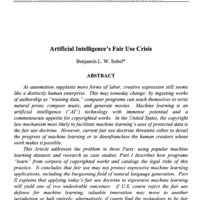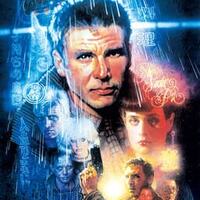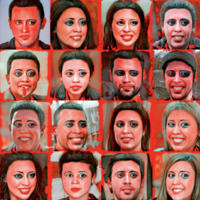Artful Intrusions—A Hacker's Guide to Generative AI
Item
-
Titre de la conférence
-
Artful Intrusions—A Hacker's Guide to Generative AI
-
Date de la conférence
-
12 October 2023
-
Résumé
-
Les modèles d’IA générative, bien que capables de produire des images convaincantes, occultent souvent leurs processus créatifs. Ils fournissent une forme illusoire de production médiatique, dans laquelle les mécanismes de formation sont obscurcis par des processus de boîte noire. Cette conférence présentera trois projets artistiques : Being Foiled, Teratome et Ghosts, tous nés d'une approche hacker de l'IA générative. Ces travaux sont le résultat de différentes interventions dans les phases d’entraînement et de génération de modèles d’IA, chacune offrant un aperçu unique du fonctionnement des processus génératifs à l’oeuvre.
-
Est relié à une autre conférence du séminaire
-
The Computational Turn in Visual Political Communication Research
-
My lines drawn by AI
-
Table ronde - Olga Kisseleva, Frank Madlener, Gaëtan Robillard
-
Après l’intelligence artificielle, l’éthique, les tics, l’esthétique
-
De l’intelligence en essaim à l’intelligence artificielle
-
Deepfakes ou synthèse vocale
-
Introduction - Gaëtan Robillard et Renée Bourassa
-
Converser avec l’IA : entre feintise ludique, stratégie de tromperie
-
Mesonet : Détecter la falsification de vidéos deepfakes
-
Table ronde - Fabien Richert, Constantine Boussalis, Gaëtan Robillard
-
Table ronde - Vincent Nozick, Nicolas Obin, Gaëtan Robillard
-
Table ronde - Terence Broad, Kazushi Mukaiya, Gaëtan Robillard
-
Citation tirée de la conférence
-
« Ultimately, I kind of came to this realization that what I was trying to do was I was trying to train a generative model without modelling data which is an oxymoron, it's a complete contradiction. It took me about a year to really figure this out but once I did, that was quite helpful, quite constructive, it made me rethink the problem, reframe the research I was trying to do, and so then I started thinking: "ok, we're not trying to train something from scratch to do something that isn't modelling data, how do we just push or nudge a general model away from an existing data set?" So how do we take something that's already been trained, and how do we kind of move it in a direction. And I ended up—instead of looking at very theoretical statistics in cognitive science—just looking at the actual structure of the models and really just thinking about their component parts. How can we play around with this? The talk is kind of an hacker's guide, and I started taking a hacker's mentality to working with generative AI where I was really just trying to pull these things apart, figure out what you can do, figure out the unintended ways that you could use them, figure out ways of using them that you weren't really supposed to do. »
-
« StyleGAN—you know the deepfakes of people—there's a website [called] ThisPersonDoesNotExist that's all using a GAN, using StyleGAN, and the way the GAN works is that we have these two networks, a generator and a discriminator. When I'm teaching about this I sort of introduce this like one person is a forger—that's the generator—and then the discriminator is a detective. So if someone's forging money, trying to make fake bank notes, then the discriminator is the person at the bank trying to figure out is this real money or is this fake money, and these are extremely effective. So the discriminator is trying to tell what's a real image compared to what's being generated, what's fake, and the generator's got this adversarial opposite objective which is: I want to generate things that trick the discriminator, passed off as being real. In this setup, the generator has one objective, and that objective is: I just need to trick this other network, I just need to get my bank notes passed off as real money, so to speak, or get my images of people or whatever passed off as being real, training data. »
Linked resources
Items with "Est relié à une autre conférence du séminaire: Artful Intrusions—A Hacker's Guide to Generative AI"
| Title |
Class |
| Après l’intelligence artificielle, l’éthique, les tics, l’esthétique |
Conference
|
| Converser avec l’IA : entre feintise ludique, stratégie de tromperie |
Conference
|
| De l’intelligence en essaim à l’intelligence artificielle |
Conference
|
| Deepfakes ou synthèse vocale |
Conference
|
| Introduction - Gaëtan Robillard et Renée Bourassa |
Conference
|
| Mesonet : Détecter la falsification de vidéos deepfakes |
Conference
|
| My lines drawn by AI |
Conference
|
| Table ronde - Fabien Richert, Constantine Boussalis, Gaëtan Robillard |
Conference
|
| Table ronde - Olga Kisseleva, Frank Madlener, Gaëtan Robillard |
Conference
|
| Table ronde - Terence Broad, Kazushi Mukaiya, Gaëtan Robillard |
Conference
|
| Table ronde - Vincent Nozick, Nicolas Obin, Gaëtan Robillard |
Conference
|
| The Computational Turn in Visual Political Communication Research |
Conference
|
Items with "Autres fiches liées à celle ci qui vont apparaître dans le bas de la fiche sur edisem comme contenus recommandés: Artful Intrusions—A Hacker's Guide to Generative AI"
| Title |
Class |
 7 Configurations 7 Configurations |
Event
|
Annotations
There are no annotations for this resource.
 Terence Broad
Terence Broad
 A guy trained a machine to “watch” Blade Runner. Then things got seriously sci-fi.
A guy trained a machine to “watch” Blade Runner. Then things got seriously sci-fi.
 Artificial Intelligence's Fair Use Crisis
Artificial Intelligence's Fair Use Crisis
 7 Configurations
7 Configurations



